If you’ve ever had the pleasure of meeting an endurance athlete, you’ve probably seen firsthand just how dedicated they are.
From the moment they wake up to the early bedtimes they stick to, endurance athletes go the extra mile when it comes to everything they do.
They also focus most of their waking hours on building the perfect machine that is their body.
This means working out regularly, watching the food they eat, and logging enough sleep each night to recover from their hard days.
Endurance athletes have that admirable ability of staying dedicated to achieve any goal they set. Once they complete a goal, they don’t just bask in the glory; they set another seemingly impossible goal to tackle.
So how do they stay energized and focused every day?
To say that endurance athletes pay special attention to their diets is an understatement. With a poor diet, they’d never be able to cross a finish line 70.3 miles away, right?
Following a diet packed with superfoods lets endurance athletes become super humans able to overcome any feat they’re faced with.
So whether you’re gearing up for your first half marathon or you’re mid-way through training for your third Ironman competition, the 12 foods on my list are geared towards giving you the natural boost you need to conquer anything.
1. Chia seeds
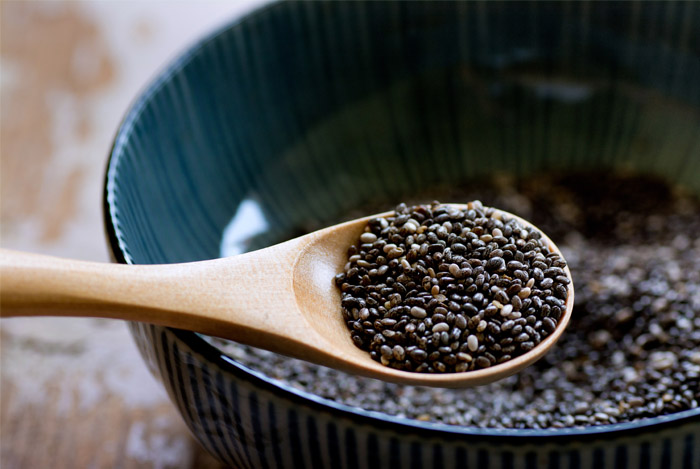 When it comes to endurance, very few foods can compete with my favorite superfood for endurance athletes, which just so happens to be the small, unassuming chia seed.
When it comes to endurance, very few foods can compete with my favorite superfood for endurance athletes, which just so happens to be the small, unassuming chia seed.
But don’t let their size fool you, these seeds mean business.
Aztec and Mayan warriors relied on these powerful seeds to hold them over during battle. They believed these tiny black seeds gave them endurance and power without weighing them down during long treks without meal breaks.
We’re still learning about the power behind these ancient nutritional powerhouses today.
One study compared the effects of consuming 100% of calories from Gatorade versus a mix of 50% chia seeds plus 50% Gatorade on six male endurance athletes. These individuals had to run for 90 minutes on either the Gatorade or the Gatorade and chia mix.
After that, the athletes endured a two-week washout period before repeating the same exercises using the opposite source of fuel.
The result: “There was no statistical difference” between the groups. Which means athletes can cut down on the added sugars found in Gatorade without sacrificing their performance.
Plus, chia seeds have a ton of amazing omega 3s, which will benefit athletes by providing:
- Faster recovery
- Reduced muscle soreness
- Increased fat burning
- A slowed rate of muscle loss
You can actually skip the Gatorade altogether and make a chia energy drink instead.
You’ll need:
- 2 cups of coconut water
- 2 tbsp of chia seeds
- A good squeeze of fresh lemon
- Sweetener of choice
Combine chia seeds with coconut water in a jar or glass; let sit for 5–10 minutes. Once the chia seeds have grown in size or are suspended in the liquid mixture, add your favorite natural sweetener and a fresh squeeze of lemon.
This works so well as a pre or post workout drink; it’s actually one of my favorites.
2. Quinoa
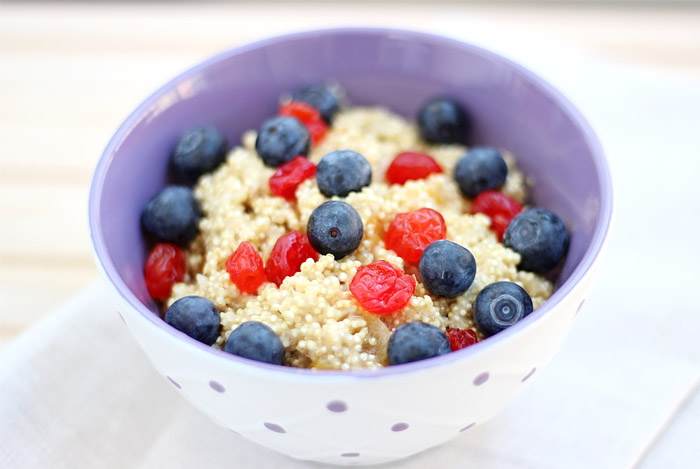 Quinoa is another ancient superfood that should be in every endurance athlete’s pantry. Similar to chia seeds, quinoa packs plenty of nutrition into a tiny punch.
Quinoa is another ancient superfood that should be in every endurance athlete’s pantry. Similar to chia seeds, quinoa packs plenty of nutrition into a tiny punch.
You’ll find important minerals such as iron, magnesium, phosphorus, zinc, copper, and manganese to keep your body performing at its best.
According to Elaine Marie Conrad of Stack, “Quinoa provides all the essential nutrients for muscle recovery. One cup of quinoa delivers minerals, fiber, antioxidants, enzymes, all nine essential amino acids and nine grams of protein”.
Conrad also says that the lysine found in quinoa helps to “repair and grow muscle tissue faster”, which is a must-have for endurance athletes hitting the pavement for long stretches of time.
Additionally, the iron content in quinoa gives your body the energy it needs to power through tough workouts while also delivering oxygen to the muscles that need it most.
Conrad even notes that female endurance athletes really benefit from the amount of iron found in quinoa since women are prone to iron deficiency due to their periods.
On top of that, quinoa can be enjoyed for breakfast, lunch, or dinner. Its versatile and neutral flavor makes it easy to add to any dish. I love substituting quinoa for oatmeal, pasta, or rice in my favorite recipes.
3. Oatmeal
 Carbohydrates are an excellent food source for athletes, especially for those exercising past the 90 minute mark. But we all know that certain carbs can weigh you down while others give you the energy you need.
Carbohydrates are an excellent food source for athletes, especially for those exercising past the 90 minute mark. But we all know that certain carbs can weigh you down while others give you the energy you need.
And that’s where oatmeal comes in handy.
It’s a slow digesting carb that keeps you in the latter category.
Oats also contain essential B vitamins for energy and metabolism, magnesium for recovery, protein to keep you going, and iron to keep your muscles happy and your energy levels high.
As a form of soluble fiber, oats also aid in digestion and help keep those unwanted extra pounds off.
When choosing your oatmeal, skip the instant sugar-filled packets and reach for steel cut or old fashioned oats. They make take a little longer to prepare, but the nutrition you’ll gain will be well worth it.
4. Walnuts
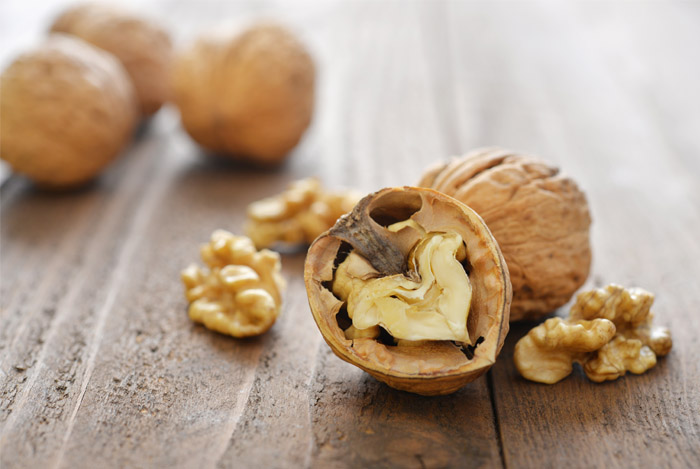 Walnuts may not have been your first choice for endurance runs, but they’re certainly worth considering.
Walnuts may not have been your first choice for endurance runs, but they’re certainly worth considering.
First, walnuts are packed with anti-inflammatory omega 3s just like chia seeds.
They also contain protein, fiber, and essential vitamins such as B and E.
As if that isn’t enough, walnuts are also great for heart health – an essential for anyone considering feats past the 13 mile mark.
5. Kale
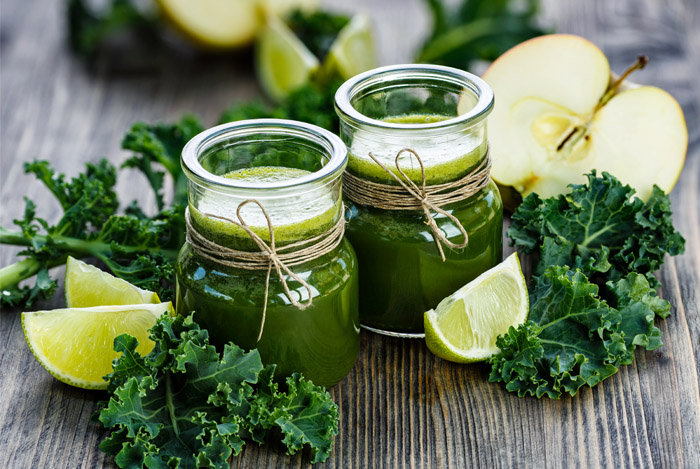 You’ve probably never heard an athlete bragging about kale being a go-to meal for endurance. I mean, it’s pretty hard to chow down on a mega kale salad before a big run.
You’ve probably never heard an athlete bragging about kale being a go-to meal for endurance. I mean, it’s pretty hard to chow down on a mega kale salad before a big run.
But you may want to throw a handful of kale in your whey protein smoothies when you hear this.
Kale is loaded with protein and fiber, and it’s also bursting at the natural seams with magnesium, calcium, omega 3s, vitamin K, and vitamin C.
This healthy mix keeps inflammation at bay, your bones uber healthy, and your immune system strong.
Plus, the magnesium found in kale (31 mg per cup) helps “assist performance by reducing accumulation of lactic acid and reducing the perception of fatigue during strenuous exercise through its action on the nervous system”, according to Triathlete.
That means you can say sayonara to that side-splitting pain and those feelings of fatigue interrupting your runs.
And for those training in warmer climates (think: hot and humid), Triathlete recommends an increase in magnesium since it’s often lost through sweat. Kale to the rescue!
6. Spinach
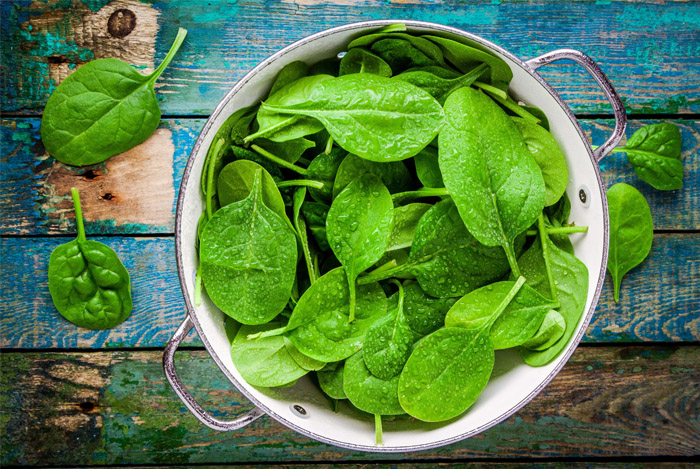 Popeye made it easy for us to associate spinach with having big muscles, but it’s also good for going the distance.
Popeye made it easy for us to associate spinach with having big muscles, but it’s also good for going the distance.
Aside from giving you a boost with protein, spinach also contains “twice the amount of iron as other leafy greens”, according to Men’s Fitness.
Iron is essential for endurance athletes. It helps with:
- Energy metabolism (keeps your energy levels up)
- Oxygen transport (giving your muscles the oxygen they need to perform)
- Acid-base balance (maintaining the proper pH balance/homeostasis)
You’ll also find vitamin K (for bone health) as well as performance boosting nitrates in spinach.
According to the Daily Health Post:
“Scientists found that study participants who ate the equivalent of 200 to 300 grams of spinach per day over the course of three days had better muscle performance”.
To see these benefits, I usually add raw spinach right into my pre or post workout smoothies. The taste is neutral, and aside from the light green color (depending on how much you use), you can’t even tell it’s in there.
7. Sweet Potatoes
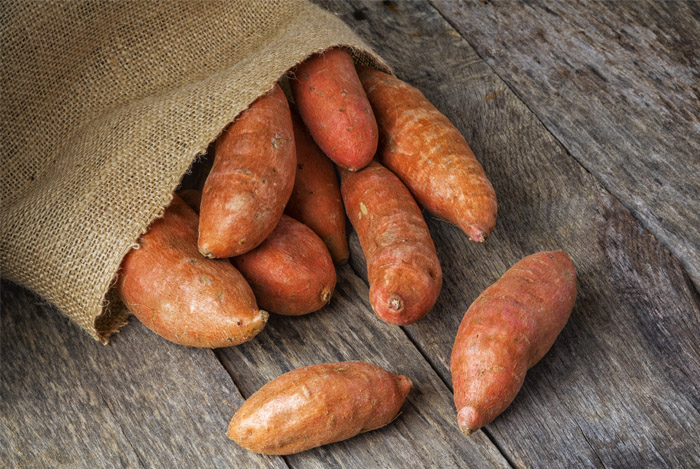 Back to the notion that carbs are an endurance athlete’s best friend, you don’t have to settle for grains and pastas when getting your carb fill.
Back to the notion that carbs are an endurance athlete’s best friend, you don’t have to settle for grains and pastas when getting your carb fill.
Sweet potatoes are an excellent alternative since they’re a great, natural fuel source for us.
When boiled with the skin on for 30 minutes, sweet potatoes actually have a glycemic index rating of 46, which is considered moderate on a low to high scale. But LiveStrong points out that these spuds can quickly turn into a high GI food (with a 94 rating) if cooked for 45 minutes instead of 30.
As long as you keep them in this moderate cooking range, sweet potatoes won’t spike your insulin levels. So instead of experiencing an initial surge of energy followed by a crash, you’ll be able to power through any long-distance race.
Plus, unlike most pastas, sweet potatoes also come with a handful of vitamins, such as A and C, and minerals like potassium and magnesium.
You’ll also find a bit of protein (4 g per cup) and fiber (7 g per cup) – both of which are essential for anyone attempting endurance-type races.
8. Salmon
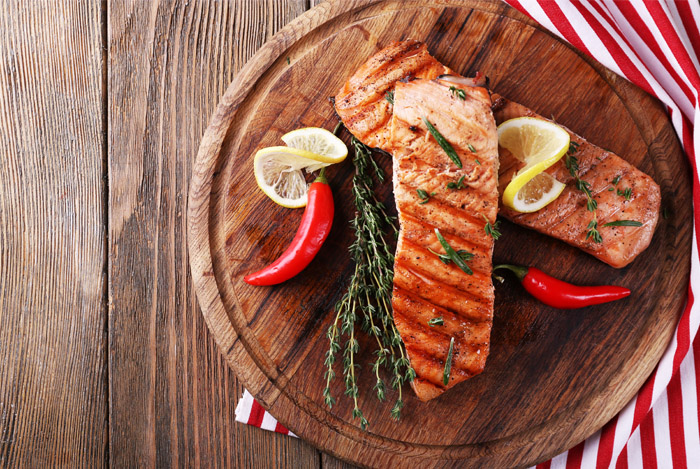 No, I’m not going to tell you to add salmon to your next smoothie recipe.
No, I’m not going to tell you to add salmon to your next smoothie recipe.
In fact, salmon’s probably not the best pre-workout option, but for recovery, salmon is a must-have.
The omega 3s found in salmon play a huge part in reducing inflammation (especially the kind brought on by intense training sessions), so it’s no wonder that this healthy fatty fish made the cut.
But that’s not all salmon can do for us.
According to Training Peaks, omega 3s can also “increase oxygen delivery to the heart muscle thus reducing the load from it as it needs to work less hard in order to provide oxygen for its own work”.
This is huge news for endurance athletes and for anyone trying to beat last year’s numbers.
9. Omega 3 Rich Eggs
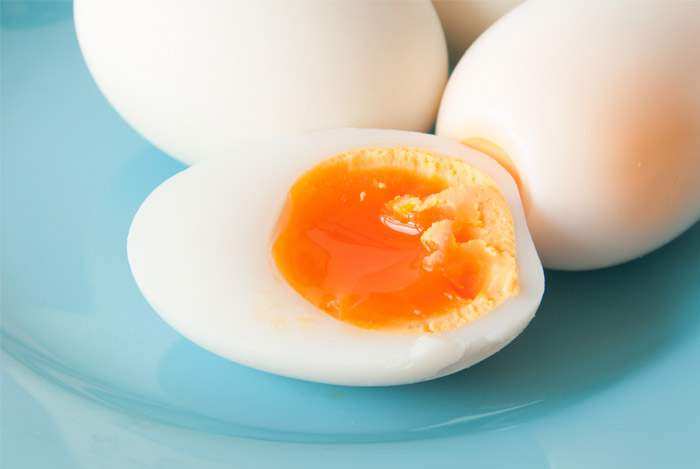 Eggs should be a staple in everyone’s diet, but this couldn’t be more appropriate for endurance athletes in particular.
Eggs should be a staple in everyone’s diet, but this couldn’t be more appropriate for endurance athletes in particular.
When you’re tucking into a few eggs, you’re getting protein plus all of your essential amino acids, important vitamins, and minerals.
And when you buy antioxidant-rich omega 3 eggs you’ll also enjoy having an extra boost of energy and improved recovery after your workouts thanks to their anti-inflammatory benefits.
Hard boil a dozen for the week and you’ll have a healthy, portable snack fit for any tough workout.
10. Whole Wheat Pasta
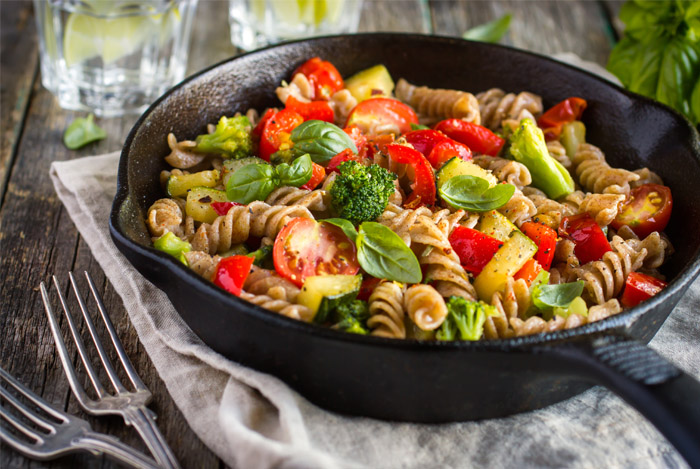 Since carbs are at the forefront of endurance training, this list wouldn’t be complete without some form of pasta on it.
Since carbs are at the forefront of endurance training, this list wouldn’t be complete without some form of pasta on it.
But I don’t want you to reach for just any pasta.
Instead of using overly processed white flour based pasta, you’ll want to reach for slow-digesting whole wheat pasta.
With a low-GI rating, whole wheat pasta gives you that sustained energy I talked about earlier (just like sweet potatoes). You’ll feel like you have almost the same high energy level whether you’re at mile 10 or 20.
Now you’ll just have to focus your thoughts on powering through to the finish line.
On top of that, when switching to whole wheat you’ll also find fiber, vitamins, and minerals, which have all been stripped during processing in the white flour variety.
If your workouts leave you feeling tired afterwards, that’s a good sign that your body is craving healthy carbs as a fuel source. So reach for whole wheat pasta for your good post-workout option.
And if your energy levels are slacking before your scheduled training session, carbs may be better absorbed by your body pre workout. Give yourself enough time before training to digest the carbs or you’ll feel a bit woozy during your session.
You should listen to your body to see how you respond to eating before and after your workouts; that’s the only way you’ll know which time to eat is right for you. You may even find that a balance of pre and post workout carbs is best.
11. Bananas
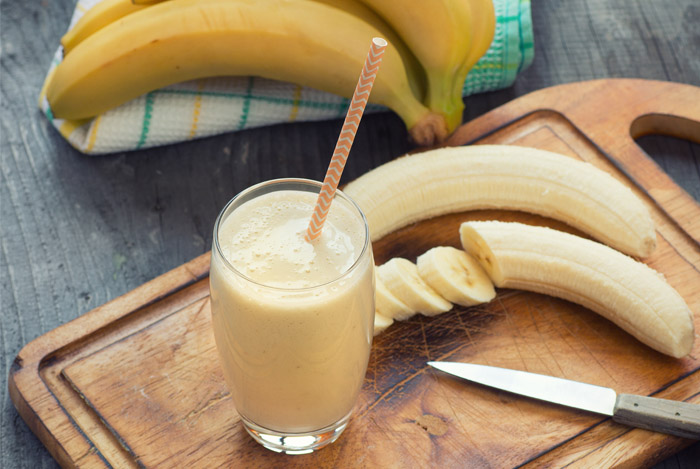 Bananas should be another no-brainer on any athlete’s dietary grocery list.
Bananas should be another no-brainer on any athlete’s dietary grocery list.
They’re loaded with potassium – which prevents “muscle cramping, weakness, fatigue, heart palpitations and constipation” – and they give you a quick burst of energy thanks to their good carbohydrates.
And similar to the chia seed study, when used to replace sports drinks like Gatorade, researchers at ASU found that swapping the sugary drink with bananas did not affect the performance of the endurance athletes who were studied.
Bananas also gave the athletes the added benefits of fiber and vitamin B6 to help “convert proteins and sugars into energy, and are used during the production and repair of cells”.
Beat that, sports drinks!
12. Cherries & Tart Cherry Juice
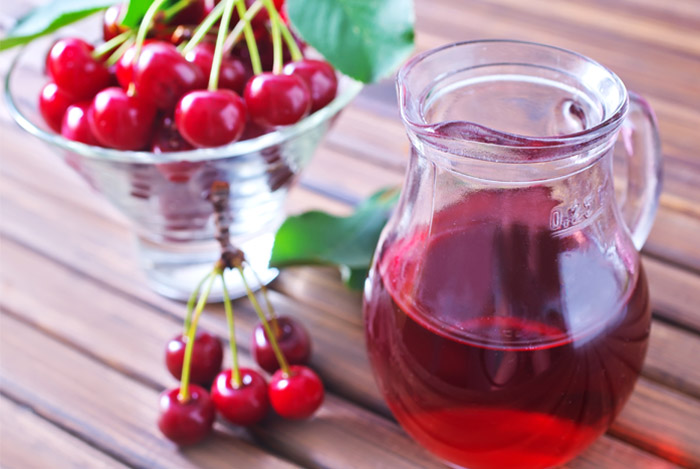 Cherries are becoming very popular due to their weight loss benefits, but I’d argue that their health benefits go much deeper than giving you a slimmer waistline (which is still awesome!).
Cherries are becoming very popular due to their weight loss benefits, but I’d argue that their health benefits go much deeper than giving you a slimmer waistline (which is still awesome!).
Their dark red hue is a giveaway that they’re full of antioxidants that help to fight inflammation. And for someone hitting long training sessions, this is like heaven on earth for recovery.
According to Matt Frazier of Competitor:
“Studies conducted over the past five years have found that regular consumption of tart cherry juice may accelerate post-workout recovery, increase overall training capacity and enhance performance in races by reducing muscle pain”.
You can certainly get the same benefits from eating whole cherries, but it may take you more than the concentrated amount found in juice.
I’m always a fan of getting everything from as close to the source as possible (hello, extra fiber), but if it’s more convenient or if cherries are out of season for you, tart cherry juice is fine.
So whether you have your eye on a triathlon or your first marathon, you should start adding these superfoods to your diet as soon as possible.
Your body will thank you and you may just be surprised by how much you can accomplish given the proper fuel, which is saying a lot for accomplished endurance athletes.
Which endurance promoting superfoods are your go-to’s? Share your favorites in the comments!
The post 12 Superfoods to Boost Endurance in Athletes appeared first on Nutrition Secrets.
http://www.nutritionsecrets.com/foods-to-boost-endurance/
No comments:
Post a Comment